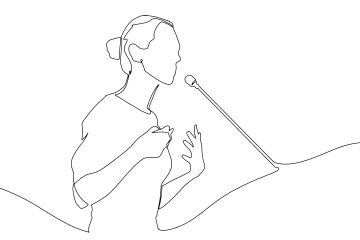
Russia’s War in Ukraine and Women’s Agency
Despite the unabated destruction and devastation caused by Russia’s full-scale invasion of Ukraine, the war also opened new doors for development and a leap in women’s agency. Ukraine is fundamentally rethinking gender roles, expanding the opportunities of its citizens, and serving as a model for other countries. The Armed Forces of Ukraine have become the first place where women’s voices have been amplified. Ukraine has allowed women to participate in military operations to guarantee national security and defence, as they repel and deter armed aggression by Russia. Currently, 40,000 women serve in the Armed Forces, including those in combat roles. Furthermore, 8,000 women hold officer positions, and 5,000 serve on the front lines. In the near future, a separate combat …

OxPol Blogcast. Women In Politics – In Conversation with Patricia Owens: Recovering Women’s International Thought From the Shadow of History
OxPol Blogcast showcases research, analysis, insights, and experiences from the members of the University of Oxford’s Department of Politics and International Relations (DPIR), and specialist guests from the Oxford academic community and beyond. Why were the contributions of some thinkers in the field of International Relations erased from history, while others became prominent enough to reach the reading lists of today? Many of those thinkers, whose perspectives never got to see the light of day, happen to be women. On this episode of the OxPol Blogcast, host Anastasia Bektimirova is joined by Dr. Patricia Owens, a Professor of International Relations at the Department of Politics and International Relations at the University of Oxford, who is recovering the thinkers lost in the 20th century by writing a gendered history …

OxPol Blogcast. Women In Politics – In Conversation with Mary Ann Sieghart: Is There a Gendered Authority Gap?
OxPol Blogcast showcases research, analysis, insights, and experiences from the members of the University of Oxford’s Department of Politics and International Relations (DPIR), and specialist guests from the Oxford academic community and beyond. Are women taken less seriously than men in politics? What causes the authority gap, and how is it manifested? On this episode of the OxPol Blogcast, host Anastasia Bektimirova welcomes Mary Ann Sieghart, the author of the best-selling book The Authority Gap: Why Women Are Still Taken Less Seriously Than Men, and What We Can Do About It. Having spent three decades covering British politics as a journalist, Mary Ann draws on her observations and interviews with fifty of the world’s most powerful, successful and authoritative women to discuss the experiences and causes of the …

OxPol Blogcast. Women in Politics – In Conversation with Rachel Bernhard: Can Gender-Typical Appearance and Behaviour Help Candidates Win Office?
OxPol Blogcast showcases research, analysis, insights, and experiences from the members of the University of Oxford’s Department of Politics and International Relations (DPIR), and specialist guests from the Oxford academic community and beyond. Are masculine behaviour and appearance among the prerequisites for electoral success, in line with popular belief? On this episode, OxPol Blogcast host Anastasia Bektimirova is joined by Dr. Rachel Bernhard, an Associate Professor at the University of Oxford’s Department of Politics and International Relations (DPIR), to put the view of the political arena as a place favouring conventionally masculine traits to a test. Focusing on the United States, Rachel explains what is understood as masculinity and femininity in political leadership, and guides us through the observed variation in voters’ response to those cues. We also discuss …

OxPol Blogcast. Women in Politics – Formal and Informal Politics of Women’s Representation and Activism in Latin America
OxPol Blogcast showcases research, analysis, insights, and experiences from the members of the University of Oxford’s Department of Politics and International Relations (DPIR), and specialist guests from the Oxford academic community and beyond. On this episode, we are focusing on the state of women’s descriptive and symbolic representation in party and civil society politics across Latin American countries. OxPol Blogcast host Anastasia Bektimirova welcomes three guests to bring you the stories of women’s agency at different levels of political participation in the region. The guests are sharing their expert view on the social environment, political culture, policies as well as written and unwritten rules that are shaping women’s progress and experiences in pursuing elected office, and engaging politically from civil society. With Dr. Malu Gatto, an Associate …

OxPol Blogcast. Women in Politics – Violence Against Women in Political and Public Life
OxPol Blogcast showcases research, analysis, insights, and experiences from the members of the University of Oxford’s Department of Politics and International Relations (DPIR), and specialist guests from the Oxford academic community and beyond. On this episode, we discuss how gender-based violence, one of the most devastating human rights issues of our time, manifests itself in political and public life. OxPol Blogcast host Anastasia Bektimirova welcomes four guests to unpack the issue of violence against women, the many forms it can take, how the experiences vary between serving politicians and candidates, men and women, and the activities, initiatives and mechanisms that are in place to combat it and help those who have become victims. With Reem Alsalem, the United Nations Special Rapporteur on violence against women, its causes and …

A Historical Perspective on the Political Limits of “My Body, My Choice”
In the context of the U.S. Supreme Court repeal of Roe v. Wade, the struggle for access to abortion and reproductive freedom continues. In Germany, abortion remains a criminal act only granted under specific conditions and requirements. Apart from ethical and legal requirements, abortions are hardly mentioned in most medical curricula. There is a shortage of medical practices that perform abortions, especially in rural areas and if there is no “medical or criminological indication”, the procedure is not covered by health insurance, costing between €300 to €600. §218 of the criminal code that criminalises and regulates abortion is a remnant from the imperial penal code of 1871 (only the GDR legalised abortion in 1972). Radical feminists in Germany were at …

OxPol Blogcast. Women in Politics – In Conversation with Marta Antonetti: Role Model Effect, Political Representation, and Intersectional Methods
OxPol Blogcast showcases research, analysis, insights, and experiences from the members of the University of Oxford’s Department of Politics and International Relations (DPIR), and specialist guests from the Oxford academic community and beyond. On this episode of the OxPol Blogcast, host Anastasia Bektimirova is joined by Marta Antonetti, a DPhil Politics researcher at the University of Oxford’s Department of Politics and International Relations (DPIR). Marta guides us through her research on the effect of having diverse role models in politics on widening political participation among the underrepresented groups. We also discuss what it means to take an intersectional approach in social science research, and why it is important. Find out more about Marta’s research at https://www.politics.ox.ac.uk/person/marta-antonetti This episode is part of the series Women in Politics: Perspectives from …









